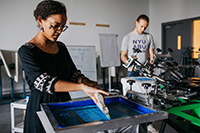Microfluidic devices offer several advantages for cell biology such as high-throughput screening, portability, inexpensive platform and reduced sample volume and reagents. The use of microfluidic chips can be extended beyond mammalian cells to any microorganisms such as algae and E. coli. Micro algae with a size of few micrometers are abundantly present in the Gulf region and are of great interest for production of biofuels. To facilitate progress in marine biology research and speed up the progress of screening for strains of algae that produce just the right lipids for the fuel and possible factors inducing increased algae production, the goal of this project is to build a microfluidic chip to culture algae under different growing conditions. Different algal species will be trapped in the microfluidic chip, cultured under different conditions, individually monitored and those species with the highest lipid production are sorted out for further investigation. A highly multiplexed microfluidic chip to culture different algae species under various conditions will have a high impact on the biofuel energy research.
 Your journey to NYUAD starts here. Attend an application workshop or information session.Admissions Events
Your journey to NYUAD starts here. Attend an application workshop or information session.Admissions Events Live the possibilities. Be part of a dynamic community of students from over 115 countries.Take a Tour
Live the possibilities. Be part of a dynamic community of students from over 115 countries.Take a Tour